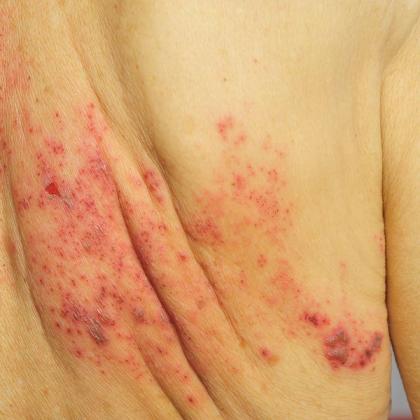Post-herpetic neuralgia (PHN) is the most common complication following an episode of shingles and can affect up to one in five people. Pain is typically described as burning or like an electric shock and is often associated with allodynia and hyperalgesia. It can have significant effects on both physical and psychological well-being, with sleep disturbance and depression being frequently described. PHN is notoriously difficult to treat, with a significant number of patients achieving only a modest reduction in their symptoms despite combinations of analgesic agents. In this episode, Dr Kate Chesterman explores the treatment options available in primary care.
Key take-home points
- PHN describes pain persisting for 3 or more months after the onset or healing of a shingles rash.
- The rash occurs in the same distribution as the shingles episode and is caused by herpes zoster-induced neuronal damage.
- The development of PHN is more common in older age, in those who had a severe prodrome, rash or acute shingles pain and in those who are immunosuppressed or have diabetes or ophthalmic involvement.
- There is some evidence that prompt treatment with antiviral therapies during an acute shingles episode can prevent the development of PHN.
- Tricyclic antidepressants have proven efficacy in reducing the pain associated with PHN, although they are not licensed specifically for this indication. They are started at a low dose and titrated as needed. Side effects such as confusion, sedation and urinary retention may limit their use in some patients.
- Gabapentin and pregabalin have also been shown to reduce pain and improve sleep in patients with PHN and are often considered when the tricyclics are ineffective, not tolerated or contraindicated. Duloxetine might help to reduce neuropathic pain and may also help to improve depression associated with having a long-term pain condition. As with the tricyclics, duloxetine and pregabalin are not licensed specifically for the treatment of PHN.
- Opioids are usually recommended for acute rescue therapy rather than long-term use, due to the risk of side effects and addiction.
- Two topical treatments are also available: 5% lidocaine plasters and capsaicin 0.075% cream.
- Combination treatment may be required to achieve satisfactory levels of pain control.
- A referral to a pain clinic might be helpful for those with refractory symptoms, severe pain or pain that is significantly interfering with their daily activities.
- The shingles vaccine has resulted in significant reductions in the incidence of both shingles and PHN, and it is worth encouraging this in those who are eligible.
Key references
- NHS. 2025. https://www.nhs.uk/conditions/post-herpetic-neuralgia/.
- CDC. 2024. https://www.cdc.gov/shingles/signs-symptoms/index.html.
- Patient. 2024. https://patient.info/skin-conditions/shingles-herpes-zoster-leaflet/postherpetic-neuralgia.
- Shingles Support Society. 2024. https://shinglessupport.org.uk/frequently-asked-questions-about-post-herpetic-neuralgia-phn/.
- Gruver C, Guthmiller KB. StatPearls [Internet]. 2023. https://www.ncbi.nlm.nih.gov/books/NBK493198/.
- Shingles Support Society. 2018. https://shinglessupport.org.uk/wp-content/uploads/2022/11/Guidelines-by-Dr-Serpell.pdf.
- Saguil A, et al. Am Fam Physician. 2017;96(10):656-663.
- NICE. 2020. https://www.nice.org.uk/guidance/cg173.
- Vaccine Knowledge. 2023. https://vaccineknowledge.ox.ac.uk/shingles-vaccine#More-information-about-the-vaccine.
Create an account to add page annotations
Annotations allow you to add information to this page that would be handy to have on hand during a consultation. E.g. a website or number. This information will always show when you visit this page.
